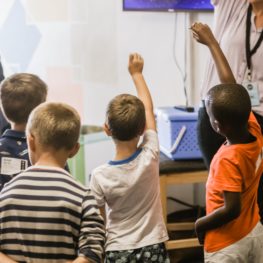INSTRUCTORS:
Eleni Gavra
Professor Department of V.S.A.S. University of MacedoniaAddress
University of Macedonia, Egnatia 156 View mapCategories
Education & Special EducationTο Κέντρο Επιμόρφωσης και Δια Βίου Μάθησης του Πανεπιστήμιου Μακεδονίας, διοργανώνει Πρόγραμμα Επιμόρφωσης, με τίτλο «ΔΙΑΠΟΛΙΤΙΣΜΙΚΗ ΕΚΠΑΙΔΕΥΣΗ: ΠΡΟΣΕΓΓΙΖΟΝΤΑΣ ΤΗΝ ΠΟΛΥΠΟΛΙΤΙΣΜΙΚΟΤΗΤΑ ΣΤΟ ΕΚΠΑΙΔΕΥΤΙΚΟ ΣΥΣΤΗΜΑ», διάρκειας 452 ωρών το οποίο θα πραγματοποιηθεί μέσω πλατφόρμας ασύγχρονης τηλεκπαίδευσης .
Διάρκεια: 452 ώρες
Καταληκτική Ημερομηνία εγγράφων: 02.06.2025
Υλοποίηση: Eξ αποστάσεως σύγχρονη και ασύγχρονη τηλεκπαίδευση
Certificate: Granted by K.E.DI.VI.M. of the University of Macedonia
Scientific Officer: Eleni Gavra, Professor – Department of Balkan, Slavic & Oriental Studies, University of Macedonia
The Program is aimed at primary and secondary school teachers, adult educators, special education staff, undergraduate and postgraduate students of similar specialties, school counselors, psychologists, sociologists and social workers, the unemployed and those who wish to be educated in educational and social structures (intercultural schools and special education schools, municipalities, services and Reception structures, Refugee flows Asylum and Vulnerable Social Groups).
Any pre-existing experience on issues of intercultural approach of Vulnerable Social Groups will be highly appreciated.
This program is not part of the Center's discount policy due to the already high discount rate.
The purpose of this program is the wider scientific training and vocational training of trainees in the field of Intercultural Education on issues related to diversity and multiculturalism in the field of education as well as facilitating access to vulnerable social groups in the education system.
The purpose of the training programme is:
- Supply with knowledge and skills of those interested in the staffing of relevant structures, agencies, etc.
- Deepening in issues and data concerning linguistic and cultural peculiarities of vulnerable groups of the population (Roma, Foreigners, Returnees, Refugees, Muslims of Thrace, expatriates, etc.).
- Implementation of new educational practices for the approach and integration of different student groups.
The educational program is scored and provides a strong comparative advantage in announcements whose criteria correspond to the characteristics of the program, as well as for employment in Private Educational Organizations. Specifically, it provides two (2) points for General Education (according to Law 4589/2019 - article 57) and half (1/2) points for ongoing education executives (according to Law 4547/2018, as he was updated with Law 4623/2019 - article 24).
The way the program is conducted is with distance education and specifically, with the mixed use of modern and asynchronous distance education.
The program is intensive and specifically the teaching hours are distributed as follows:
-22 hours of modern distance learning for conducting experiential educational techniques and examples.
-430 hours of asynchronous distance learning, which will include, among other things, elaboration of works on broader topics (case studies), electronic tests per unit and presentation of final work at the end of the program in project form.
With the method of asynchronous distance learning, the trainee is given the opportunity to study regardless of time and space constraints, with the gradual provision of educational material, with a work schedule and with deadlines for submitting tests. The asynchronous distance learning platform used for this purpose is an integrated e-learning management system which has a very user-friendly interface,without the need for specialized technical knowledge or any software installation on their computer. The educational material is available in the form of texts, presentations, audiovisual media, etc., while ensuring direct communication with teachers and technical support through appropriate tools (dialogue and message exchange forums, helpdesk, etc.)
NOT PROVIDED







